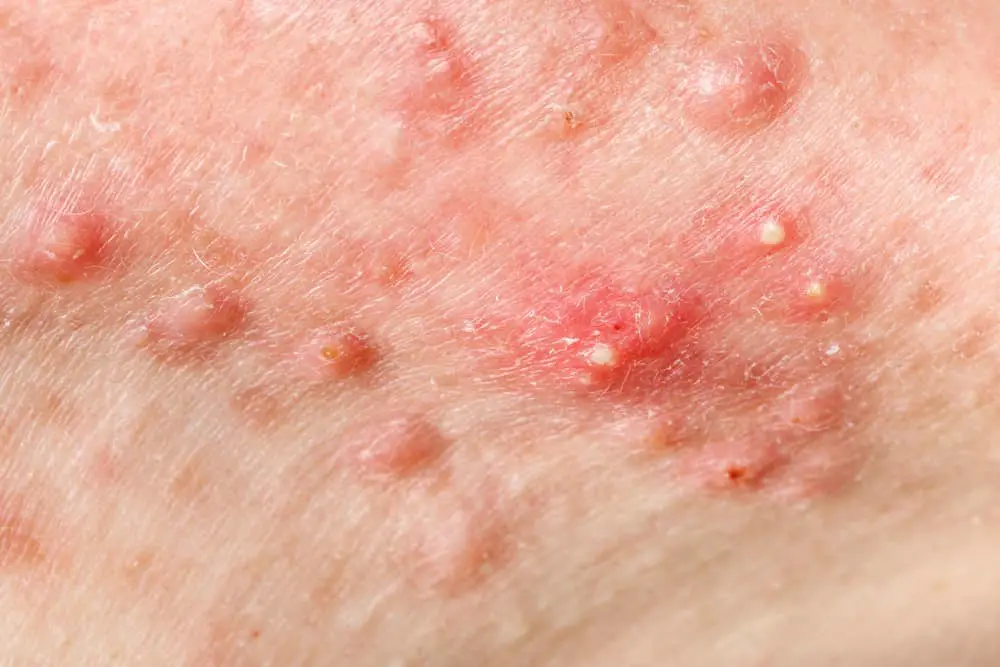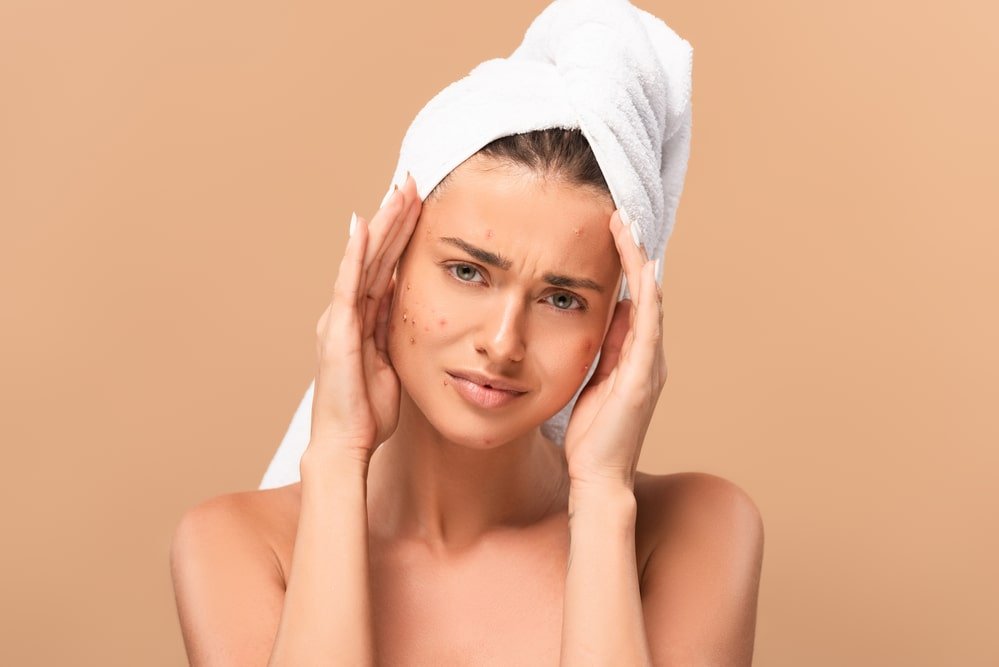Acne is rated as the commonest skin condition in the World. It affects more than 50 million Americans every year. Although it is not a life-threatening condition, it can cause emotional distress and the severe type can be painful. Acne appears on different parts of the skin, and if not managed, can result in permanent scarring. But is it normal?
Table of Contents Is Acne Normal?What Causes Acne?What Are The Other Acne Causes?Hormonal AcneBaby AcneDietary AcneStress-Induced AcneIrritationHow To Manage Acne Caused By Irritants?So, Is Acne Normal?
Is Acne Normal?
Straight up, three things cause acne;
-
Increase oil production and excess dead skin cells.
-
The mixture of oil and dead cells to form clogs.
-
When bacteria invade the clogs.
If this is what is responsible for your breakout, your acne is normal. However, external irritants like pressure, stress, etc. are not normal acne causes. Let us explain them further.
What Causes Acne?
Acne appears on different parts of the skin, especially places with the most oil glands. This is because the oil gland is directly connected to acne. Acne occurs when your skin is blocked by dead skin, bacteria, and oil. Hence, it is only normal for you to have a breakout in places where the oil glands are concentrated.
Your skin has pores that connect to oil glands beneath the skin. The glands produce oil that keeps your skin lubricated. However, the follicles connect the pores to the gland and form an effective means of transporting oil to your skin surface.
The glands make oil or sebum to prevent your skin from drying. However, in the process, the oil also transports dead skin cells via the follicles out of the skin to the surface. The follicle does not just carry oil and dead skin cells; hair grows out of it.
Acne breakout occurs when the follicles are blocked by the combination of oil and dead skin cells. When there is excess production of oil and skin cells, both tend to clog and form a lump. As a result, it is impossible to pass through the follicle at the stage. Ultimately, it lodges near the hair midway through the follicles and does not proceed to the skin.
Propionibacterium acnes are bacteria that live on the skin. However, when it notices the clog, it turns it into a breeding zone, feeding exclusively on the oil. Unfortunately, it irritates the skin and often causes inflammation. When this happens, the result is usually a swollen and reddish acne breakout.
Hence, acne will occur if your body produces too much oil, and the oil mixes with dead skin cells and bacteria. On the surface, this procedure looks normal enough.
However, your body does not automatically produce excess oil. The reason is that; the human body is designed to regulate its functions. However, there can be a disruption if the normal process is disturbed.
Hence, although acne can be a normal response of the body to bacteria, the clog and production of excess oil by external factors is not normal. Research suggests that the severity of acne varies from one person to another based on the bacteria strain. However, this is not the only cause of acne.
What Are The Other Acne Causes?
Hormonal Acne
Hormones increase and decrease during different life stages and cycles. For example, androgen increase in boys and girls during puberty. As a result, teenagers experience acne breakout a lot during puberty. The reason for this phenomenon is that androgen causes oil glands to increase and make more oil. As a result, excess oil increases the chances of having a breakout.
Hormonal acne appears in the T-zone; your nose, chin, and forehead, during puberty, menstruation, and pregnancy. Testosterone is another hormone that increases oil production. The hormone causes development in boys and gives girls bone and muscle strength. Falling estrogen levels in women experiencing menstrual cycle also increase the risk of acne.
Hence, acne is a normal response by the body in pregnant women, women going through menopause, or teenagers going through puberty. It is caused by fluctuations in hormonal balance and the acne effect will disappear after the hormonal levels are back in their place.
Baby Acne
Baby acne is another common acne that is peculiar to babies. Also referred to as neonatal acne, it occurs in 20% of newborns and can assume any form. Although the causes are not well-known, researchers posit that it is caused by infant and maternal hormones. It usually appears as small white or red bumps and occurs during the first few days after birth.
Although studies tie baby acne to maternal hormones, there are also suggestions that, since a baby’s skin is delicate, the condition can be aggravated by milk formula. Apart from this, rough fabric contact or detergent can irritate the delicate skin to make the acne worse.
Hence, baby acne is also a normal type of acne. As expected, it disappears on its own after a few weeks. Since it is not caused by anything, it disappears after with or without medical intervention. However, you might require your doctor’s help if your baby has an underlying health condition. In this case, it is possible for the acne to not clear as it is supposed to.
Dietary Acne
Dietary acne is another type of acne with a less common cause. Unlike others, it is not normal and is usually caused by certain diets. Foods that contribute to increased oil or keratin production, or directly affect the hormonal levels, for example, refined grain and sugar, can lead to acne.
Refined carbohydrates and sugar are absorbed by the bloodstream. However, both can raise sugar levels. When the levels rise, the insulin levels also increase to move the blood sugar into our cells. However, insulin increases the activities of androgen and increases insulin-like growth factor.
Dairy products are also linked to acne as it is also known to affect blood sugar levels and increase insulin levels. It also stimulates the production of more insulin-like growth factors and can cause acne. Hence, sugar, chocolate, and foods rich in refined grain, omega-6 fatty oil, and more can cause acne. Although it is a normal response of the body, acne is not normal since it can be avoided.
Unlike baby and common acne with no associated psychical cause, dietary acne is not a normal form of acne.
Related Read: Healing Acne With Diet
Stress-Induced Acne
As the name implies, some acne breakouts can be induced when you stress yourself or certain parts of your body. However, this type of acne is not normal either. On its own, stress cannot cause acne. However, it can worsen your acne condition.
If you have noticed, wounds take longer to heal when you are stressed. Hence, if you have acne, you will require more time to heal. Continual stress triggers acne. However, this response is not normal since it is self-induced.
Chronic stress increases the levels of stress-related hormones. For example, when you are stressed, your body produces more cortisol to relieve your stress. However, when your stress levels don’t drop, it can send your oil glands into overdrive. As a result, it makes more oil than is needed, and when it mixes with other acne-causing factors, leads to a breakout.
Apart from this, when the skin is stressed it loses certain self-protective abilities. Hence, stressing yourself too often can cause acne.
Irritation
Unsolicited skin irritation can cause acne. However, the problem with this type of acne is that it is also not a normal process. When you have acne, picking and picking at the site, whether due to stress, can cause irritation.
Not just this, you can transfer the pus-filled acne to another healthy site. Hence, irritating your acne is an abnormal response that causes acne.
Apart from this, holding your phones too close to your face, wearing tight gears like helmets, bras, ties, etc. can cause acne. You can also have acne through shaving irritations. All of these causes are self-induced and are not normal acne.
Hence, although acne is a natural response by the body, it can be influenced by external factors.
How To Manage Acne Caused By Irritants?
-
Wash your skin regularly, at least twice daily, especially after sweating. It will also help you limit how you wear tight-fitting gears.
-
Use non-abrasive cleaners to wash your body to prevent irritating your skin. You should also use gentle and non-comedogenic products that won’t clog your pores and cause acne.
-
Don’t scrub your skin aggressively and always rinse with lukewarm water. If there is a breakout, wait and let it heal normally to avoid the risk of scarring.
-
Consult a doctor in case of severe acne as it can be due to an underlying condition.
So, Is Acne Normal?
Acne is a normal skin condition that is caused by a change in the hormones and body system. However, different external factors can force the hormones to act out of place. When this happens, it is safe to say that acne is no more normal.
As far as it is within your control to avoid an acne breakout, you are ultimately responsible for it and it is not normal. However, like the case of puberty, pregnancy, menopause, menstruation, or genetics, acne is normal since there is little or nothing you can do about it.


Thank you for posting!